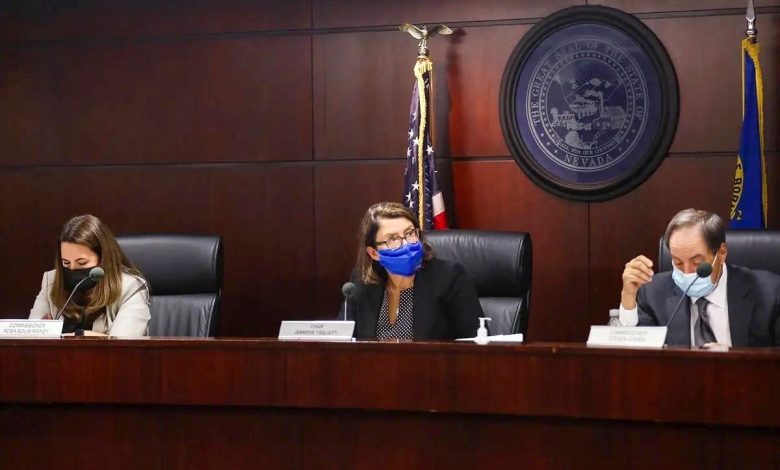Nevada Gaming Fee Approves New Laws to Thwart Cyberattacks

The Nevada Gaming Fee on Thursday authorized an modification to laws designed to guard the state’s gaming trade from cyberattacks that would cripple operations and breach buyer data.
Jennifer Togliatti, middle, presides over the Nevada Gaming Fee assembly on Nov. 18, 2021. On Thursday, the fee authorized an modification to cybersecurity laws designed to forestall cyberattacks. (Picture: reviewjournal.com)
The regulation, which matches into impact on January 1, requires operators to report all profitable breaches to gaming regulators inside 72 hours of the breach. It additionally provides operators a yr to develop danger evaluation plans that have to be up to date yearly.
The amended regulation applies to the state’s greater than 400 nonrestricted on line casino operators, in addition to to all licensed sportsbook and interactive gaming companies working within the state.
Thursday’s dialogue took lower than 25 minutes and centered on laws that confronted some preliminary opposition from operators. Representatives of the Nevada Resorts Affiliation and the Affiliation of Gaming Gear Producers have been in attendance, however voiced no objections to the modification, which had public hearings within the fall.
Edward Magaw, Nevada’s senior deputy legal professional, instructed fee members that the ultimate draft of the laws incorporate many modifications requested by the trade since a primary draft was launched in August.
New Necessities Defined
Based on the amended laws, any profitable breach compromising participant or worker knowledge, bank card data, and/or different information, have to be reported to the Nevada Gaming Management Board inside 72 hours of the breach. Operators are required to clarify the basis reason for the cyberattack, its extent, and any actions taken or deliberate to forestall related occasions from occurring.
Operators have till the top of 2023 to carry out their preliminary danger evaluation and take any mandatory and ongoing steps to push back assaults. Afterward, in response to the modification, every licensee “shall proceed to observe and consider cybersecurity dangers to its enterprise operation on an ongoing foundation.”
When an space requiring enchancment is recognized, operators have discretion on tackle it. No particular measures are dictated by the modification, solely that every operator “modify its cybersecurity greatest practices and danger assessments because it deems acceptable.”
An inside audit or impartial cybersecurity skilled should confirm operator compliance with greatest practices primarily based on the chance evaluation.
Gaming Victims
The regulation change got here solely a day after BetMGM notified patrons of an information safety situation during which buyer data – together with hashed Social Safety numbers – was “obtained in an unauthorized method,” and a month after DraftKings reported the theft of $300K from buyer accounts with compromised login data.
Final yr, the FBI’s Cyber Division reported that ransomware gangs hit a number of tribal casinos, taking down their programs, disabling linked programs, and inflicting thousands and thousands of {dollars} in damages. The targets included 4 casinos and two journey middle gaming parlors owned and operated by the Cheyenne and Arapaho Tribes of Oklahoma, and the Menominee On line casino Resort in Wisconsin.
Additionally final yr, the Dotty’s chain of 120 Nevada gaming bars reported an information breach. And in 2020, the 4 Queens and Binion’s Playing Corridor have been closed for nearly every week following a cyberattack that affected their slot machines and different programs.